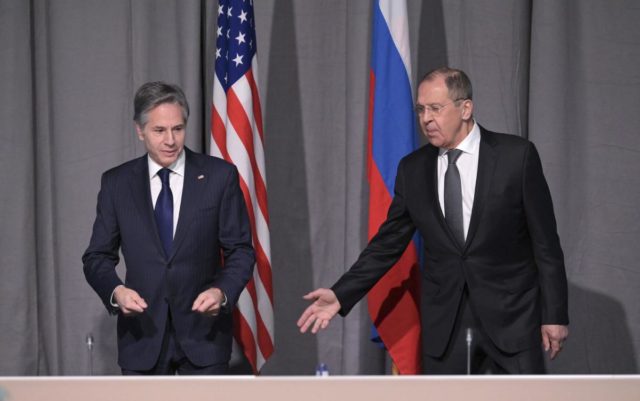
Biden Administration Aligns With Kremlin Push for Minsk ‘Agreements’ on Ukraine (Part Three)
Publication: Eurasia Daily Monitor Volume: 18 Issue: 188
By:

*To read Part One, please click here.
*To read Part Two, please click here.
Recent statements by the United States—namely, the White House and the State Department—reveal the misunderstanding and/or improper use of the vocabulary related to Russia’s war against Ukraine. The Biden administration is rapidly yielding to Russia, first, on the front of semantics (see Part Two). The administration’s self-inflicted defeat is already translating into concessions of substance to Russia at Ukraine’s expense (see Part One in EDM, December 14). Samples of the administration’s use of MinskSpeak are fast accumulating.
On December 1, during a meeting of allied countries’ foreign ministers in Riga, Secretary of State Antony Blinken approvingly quoted Russian President Vladimir Putin: “Putin said recently, and I quote, ‘There is no alternative to the full implementation of the Minsk agreements.’ ” On the US’s own behalf, Blinken “call[ed] on all sides to restore the ceasefire to the July 2020 levels.” And, “Both sides, Russia and Ukraine, have undertaken obligations under the Minsk agreements” (Ukrinform.net, December 2; State.gov, December 1). This statement wrongly suggests that the Minsk “agreements” are binding. It implies keeping Ukraine in a trap that Ukraine has tried hard for seven years to escape. While part of the statement identifies Russia and Ukraine as parties to the conflict, the other part implies something else: it asks Ukraine to reinstate the July 2020 arrangement made under duress, directly with Russia’s Donetsk-Luhansk proxies, although Ukraine subsequently disavowed that arrangement.
On December 2, Blinken stated in his speech to the Organization for Security and Cooperation in Europe’s (OSCE) annual ministerial conference (USmission.gov, Ukrinform, December 2): “[Russian Foreign Minister] Sergey [Lavrov] was talking about implementing Minsk. We fully agree.” Blinken noted that Russia has not fulfilled certain ceasefire provisions (pullback of heavy weapons, full access for the OSCE’s mission, some humanitarian gestures) while noting that Ukraine is in the process of enacting certain political provisions (special status law for Donetsk-Luhansk, amnesty law for Russia’s proxies there). On this basis, Blinken urged “our Russian friends and our Ukrainian friends to implement their Minsk commitments […] and that is the way to avert a renewed crisis in Ukraine.” These exhortations seem to equalize aggressor and victim, apparently in line with the Biden administration’s latest decision to create a tripartite negotiating forum, US-Russia-Ukraine, parallel to the “Normandy” (Russia, Ukraine, France, Germany) forum. Lavrov, however, predictably retorted that Minsk does not commit Russia to anything because all issues, including those that Blinken raised, “must be negotiated and agreed upon by Kyiv with the Donetsk and Luhansk authorities.” To prove his strict-constructionist case, the Russian foreign minister provided Blinken and other OSCE participants with copies of the Minsk “agreements” (TASS, December 2).
Interviewed on December 3, Blinken nevertheless spoke of Russian and Ukrainian “obligations” without a basis, moreover co-equally (no aggressor-victim distinctions), and blurred the definition of parties to the conflict by asking unnamed parties to reinstate their July 2020 ceasefire (Reuters, December 3).
On December 6, Blinken told Swedish Public Television that “The Minsk agreements [are] the best way to resolve the differences over the Donbas or eastern Ukraine” (State.gov, December 7). Such euphemisms, as if merely local differences were at stake, turn out to be more than a one-time lapse.
On December 7, US National Security Advisor Jake Sullivan (briefing the media on the Biden-Putin video-conversation held that day) confirmed the administration’s support for the implementation of the Minsk “agreements” plus the “confidence-building measures” (Whitehouse.gov, December 7). Undersecretary of State Victoria Nuland echoed those words in a Senate Foreign Relations Committee hearing (Ukrinform, December 8). Nuland (alongside then-Secretary of State John Kerry) had strongly urged Kyiv to enact the “special status” during the Barack Obama administration, but ran out of time in the negotiations with Kremlin aide Vladislav Surkov.
On December 9, informing Ukraine on his conversation with Putin held two days previously, Biden “underscored the readiness of the US to engage in support of confidence-building measures [in order to] advance the implementation of the Minsk agreements” (Whitehouse.gov, December 9).
On December 13–15, Assistant Secretary of State Karen Donfried held talks in Kyiv and Moscow hoping for “progress toward ending the conflict in Donbas through implementation of the Minsk agreements.” “The US shall work closely with Ukraine and Russia to focus their attention on the fulfillment of the Minsk agreements” (State.gov, December 12; Ukrinform, December 13, 14). Thus, the state-on-state conflict is seemingly local, while Russia and Ukraine have symmetrical responsibilities to “end this conflict.” Such symmetry implies (probably unwittingly) that, if Ukraine does not fulfill “its” part, then Russia may not be obligated to “end the conflict.” It makes Russia’s actual obligation under international law to “end the conflict” conditional on Ukraine fulfilling some non-existent “obligations” to Donetsk-Luhansk, thus to Russia in practice. Donfried’s interlocutor in the Kremlin, Dmitry Kozak (Surkov’s successor as manager of this and other protracted conflicts), pronounced himself satisfied after their conversation that the US supports the Minsk process with “special status” for Donetsk and Luhansk.



